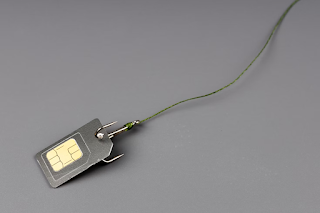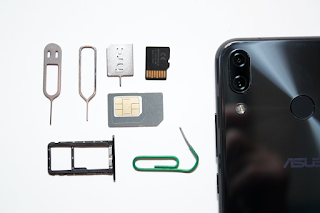
I stood at Changi Airport like an idiot, paperclip in hand, looking for a SIM slot that didn’t exist. My new iPhone 15 had no tray. Zero. Nothing. My flight to Bangkok was boarding in forty minutes and I’d just discovered my phone was basically a fancy camera without connectivity.
Then this teenager next to me, maybe seventeen, glanced over and said, “Just download an eSIM, uncle.” Uncle. That hurt. But he was right. Three minutes later, I had Thai data activated while buying overpriced airport coffee. No queue at the telecom counter. No passport photocopies. No trying to understand why the “unlimited” plan has a thousand asterisks.
Welcome to the future, where it’s simultaneously amazing and absolutely maddening.
What eSIM Really Means (Spoiler: Everyone’s Wrong)
My tech-savvy friend keeps saying eSIMs mean “no more SIM cards.” He’s completely wrong but confidently wrong, which is worse. Your phone still has a SIM chip. It’s just welded inside, imprisoned forever, waiting for software commands to change its identity. Like a digital spy that can become any carrier on demand.
Last month proved why this matters. Monday in Tokyo, Wednesday in Seoul, weekend in Manila. Old me would’ve collected SIM cards like Pokemon cards, probably losing two of them. Instead, I bought all three data plans from my couch in Singapore the night before. Landed, clicked activate, done. Faster than airport immigration.
But holy hell, the problems nobody warns you about. My banking app freaked out when my number suddenly showed as Thai. Two-factor authentication stopped working. WhatsApp thought I was a scammer. I spent my first hour in Bangkok convincing various apps I was still me, just with different digital papers.
The adoption rate is embarrassing. I did the math. Out of my twenty-something friends with phones, four have eSIM capability. Of those four, one actually uses it. Me. The others either don’t know, don’t care, or their carrier pretends the technology doesn’t exist.
Here’s the scam that makes me angry: eSIMs should be cheaper. No plastic, no shipping, no store staff. Just electrons moving through servers. Yet Airalo wants $20 for what costs $8 at 7-Eleven. We’re literally paying extra to avoid human interaction. Peak 2024.
But I keep using eSIMs for one stupid reason. My phone holds eight profiles. Eight! Personal Singapore line, work number, data plans for wherever, backup options for emergencies. Try juggling eight physical SIMs. You’d need cargo pants just for the cards.
The catch? Lose your phone, lose everything. No popping the SIM into a backup Nokia. Customer service becomes a nightmare when Karen from support doesn’t know what an eSIM is but insists you’re pronouncing “SIM card” wrong.
That’s why hybrid solutions like Maxx’s roaming SIM-only plans actually make sense right now. Physical card reliability with eSIM-style regional coverage. It’s the technology equivalent of keeping both USB-A and USB-C cables because nobody can agree on standards yet.
The Wild West of Satellite Internet
Starlink on planes changed everything for me. Singapore to London, fourteen hours of actual internet. Not the pathetic airplane WiFi that charges $40 to load Gmail. Real internet. I played online games at 30,000 feet. My opponent had no idea I was somewhere over Kazakhstan.
Elon’s satellites are just the beginning. Amazon’s launching 3,200 satellites for Project Kuiper. China’s building their own constellation. By 2027, we’ll have 20,000 satellites providing internet. The sky will literally be wrapped in WiFi.
But here’s what the hype misses: physics still exists. Satellites can’t break the speed of light. Your data travels to space and back, adding 600 milliseconds minimum. Fine for browsing, death for gaming. My friend tried competitive gaming on Starlink. The lag killed his ranking faster than you can say “packet loss.”
The real revolution isn’t speed, it’s coverage. That dead zone between Malaysia and Thailand where your phone becomes a brick? Gone. Middle of the Pacific? Connected. Antarctic research station? Four bars. Carriers are terrified because their infrastructure advantage evaporates overnight.
Apple’s already testing satellite messaging on iPhones. Samsung’s following. Within three years, your phone will seamlessly switch between towers, satellites, and whatever else provides signal. You won’t even notice. Connection will just exist, like oxygen.
5G Roaming Agreements Nobody Understands

5G roaming is broken in ways that make no sense. I get 5G in Singapore, blazing fast. Cross into Johor? Back to 3G, even though Malaysia has 5G. Why? Because carriers haven’t agreed on roaming protocols. It’s like having a Ferrari that turns into a bicycle at borders.
The technical explanation makes it worse. 5G isn’t one technology but three different types pretending to be friends. Low-band 5G (basically fast 4G), mid-band (the sweet spot), and millimeter wave (insanely fast but can’t penetrate paper). Countries deployed different types. Your phone might support American 5G but not European 5G.
China solved this by ignoring everyone else. Their 5G works great internally but barely connects internationally. Europe coordinated better but moved slowly. America… Well, America has three carriers using three different approaches because of course they do.
Gaming requires consistent low latency, which 5G promises but rarely delivers during roaming. Razer’s gaming controllers can’t fix network lag when your “5G” connection secretly drops to 3G mid-game. The controller’s perfect; the infrastructure’s garbage.
Blockchain Roaming Sounds Stupid But Might Work
Some Estonian company pitched me blockchain roaming last year. I laughed. Then they explained it, and now I’m unsure if it’s brilliant or insane.
Instead of carriers negotiating bilateral agreements, everyone joins a blockchain network. Your phone pays for data using tokens, automatically, instantly, no contracts. Cross a border, your phone finds the cheapest network and connects. No roaming agreements needed.
The prototype worked. I watched a phone switch between three carriers in seconds, always choosing the cheapest option. Like Uber for cellular networks. Carriers hate it because they lose control. Consumers would love it because prices would crater.
Will it happen? Probably not. Carriers have too much power. But the threat alone might force better roaming deals.
Why Traditional Roaming Is Already Dead
Carriers know they’re screwed. Their roaming revenue dropped 40% in three years. Not because people travel less, but because we’ve found workarounds. WhatsApp killed international calling. eSIMs destroyed SIM card monopolies. Satellite internet will finish the job.
T-Mobile just announced free international roaming in 215 countries. Sounds generous? It’s desperation. They’d rather give it free than watch customers abandon them entirely. Other carriers will follow or die.
The new business model is bundles. Connectivity plus content plus services. Singtel doesn’t just want to sell you data; they want Netflix subscriptions, cloud storage, gaming packages. The pipe becomes worthless, so they’re selling what flows through it.
Regional players are winning because they understand local needs. A Singapore-Malaysia-Thailand roaming package beats global coverage for most Southeast Asian users. European travelers don’t need African data. These focused solutions cost less and work better.
Different Users, Different Futures

Business travelers live in a different connectivity universe. Companies pay whatever it takes for reliable connection. My consultant friend expenses $500 monthly for global roaming. Her company doesn’t blink. Time is money, and disconnection costs more than any roaming bill.
Digital nomads created their own ecosystem. They share eSIM referral codes like drug dealers. They know which cafes in Ubud have Starlink. They’ve memorized every carrier’s fair usage policy. Connection strategy is survival for them.
Gamers need something nobody else prioritizes: consistent low latency. Don’t care about download speeds if ping spikes randomly. Cloud gaming promises to fix this, but we’re years away. Current infrastructure wasn’t built for millisecond precision.
Families juggle complexity nobody anticipated. Kids’ tablets need data. Smartwatches require separate plans. Cars want their own SIMs. Every device multiplies costs and management overhead. One parent told me she manages twelve data plans. Twelve!
Legal requirements add bizarre complications. Some countries require notarized documents for SIM purchases. Public notary services become necessary for basic connectivity. I needed notarized passport copies for a Pakistani SIM. For prepaid data. The future is here but bureaucracy didn’t get the memo.
The Next Five Years Will Be Chaos
Physical SIM slots disappear completely by 2027. Samsung’s already testing SIM-less phones. Carriers will fight it, lose, then pretend they supported it all along.
Satellite internet becomes standard backup. Your phone will switch to satellite when cellular fails, probably without telling you. Bills will get complicated. Customer service will get worse before it gets better.
Country borders stop mattering for connectivity. You’ll buy data like you buy Netflix: monthly subscription, works everywhere. National carriers merge or die. Three to five global providers emerge.
Prices crash for basic connectivity but spike for premium services. Free messaging and calling everywhere. Paid priority for gaming, streaming, work. The internet gets divided into classes, like airline seats.
Your phone number becomes irrelevant. Everything runs through apps anyway. Who remembers phone numbers? Identity moves to usernames, handles, wallet addresses. The ten-digit number dies unmourned.
None of this will be smooth. Every improvement breaks something else. Every solution creates new problems. But five years from now, explaining SIM cards to kids will be like explaining floppy disks today. Ancient history from primitive times when connectivity wasn’t guaranteed everywhere, always.









